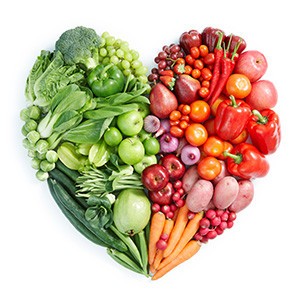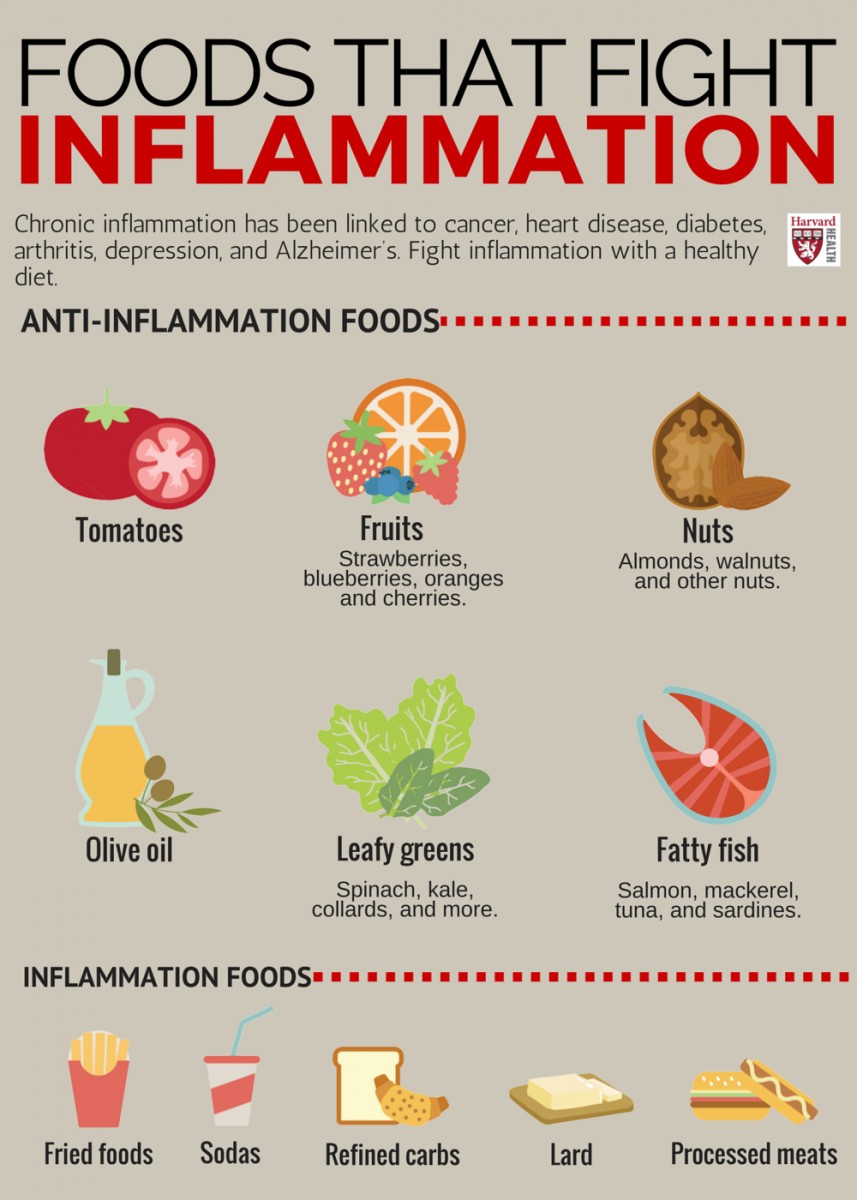Are you curious about What Are The Most Inflammatory Foods and how they impact your overall well-being? Foods.edu.vn is here to guide you through the maze of dietary choices to help you identify and avoid those that trigger inflammation, paving the way for a healthier, happier you. Discover insights on inflammatory compounds and dietary habits and unlock a wealth of knowledge at Foods.edu.vn, where we delve into the intricate relationship between diet, inflammation, and overall health.
1. Understanding Inflammation and Its Impact
Inflammation is a natural process that occurs when your body is trying to protect itself from harm. It’s your immune system’s way of signaling that it’s working to heal damage and fight off infection. However, when inflammation becomes chronic, it can contribute to a range of health problems.
1.1. Acute vs. Chronic Inflammation
Acute inflammation is a short-term response to injury or illness, characterized by redness, swelling, heat, and pain. It’s a necessary part of the healing process. Chronic inflammation, on the other hand, is a long-term condition that can persist for months or even years. It’s often caused by factors such as poor diet, stress, and environmental toxins.
1.2. The Link Between Inflammation and Disease
Chronic inflammation has been linked to a wide range of diseases, including:
- Heart disease: Inflammation can damage blood vessels and contribute to the buildup of plaque, increasing the risk of heart attacks and strokes.
- Type 2 diabetes: Inflammation can interfere with insulin signaling, leading to insulin resistance and high blood sugar levels.
- Arthritis: Inflammation is a key factor in the development of arthritis, causing pain, stiffness, and swelling in the joints.
- Alzheimer’s disease: Inflammation in the brain may contribute to the development of Alzheimer’s disease and other forms of dementia.
- Cancer: Chronic inflammation can damage DNA and promote the growth of cancerous cells.
1.3. How Diet Contributes to Inflammation
The foods you eat can have a significant impact on inflammation levels in your body. Some foods contain compounds that promote inflammation, while others contain compounds that help to reduce it. Consuming a diet high in inflammatory foods can contribute to chronic inflammation and increase your risk of disease.
2. Top Inflammatory Foods to Avoid or Limit
Identifying and limiting inflammatory foods is a crucial step in managing inflammation and promoting overall health. Here’s a list of some of the most common culprits:
2.1. Refined Carbohydrates
Refined carbohydrates, such as white bread, pastries, and sugary cereals, are quickly broken down into glucose in the body. This can lead to spikes in blood sugar levels, which trigger inflammation. They are often nutrient-poor, offering little in the way of vitamins, minerals, or fiber.
Examples of Refined Carbohydrates:
- White bread
- Pastries
- Cakes
- Cookies
- Sugary cereals
- White rice
- Pasta (made with white flour)
Why They’re Inflammatory:
- High glycemic index (GI) leads to rapid blood sugar spikes
- Promote the formation of advanced glycation end products (AGEs), which are inflammatory compounds
- Often contain added sugars and unhealthy fats
2.2. Sugary Drinks
Sugary drinks, including sodas, fruit juices, and sweetened beverages, are a major source of added sugars in the diet. These drinks can cause rapid spikes in blood sugar levels, leading to inflammation and insulin resistance.
Examples of Sugary Drinks:
- Sodas
- Fruit juices (especially those with added sugar)
- Sweetened teas
- Sports drinks
- Energy drinks
- Sweetened coffee drinks
Why They’re Inflammatory:
- High in fructose, which can promote inflammation in the liver
- Contribute to weight gain and obesity, which are risk factors for inflammation
- Can lead to insulin resistance and metabolic syndrome
2.3. Processed Meats
Processed meats, such as hot dogs, sausages, and bacon, are often high in saturated fat, sodium, and preservatives. These substances can promote inflammation in the body. They also tend to be high in advanced glycation end products (AGEs), which are inflammatory compounds formed during high-heat processing.
Examples of Processed Meats:
- Hot dogs
- Sausages
- Bacon
- Ham
- Deli meats (e.g., salami, bologna)
- Smoked meats
Why They’re Inflammatory:
- High in saturated fat, which can promote inflammation
- Contain advanced glycation end products (AGEs)
- Often high in sodium and preservatives
- Linked to an increased risk of certain cancers
2.4. Red Meat
Red meat, such as beef, pork, and lamb, is a source of saturated fat, which can contribute to inflammation. It also contains a compound called Neu5Gc, which the body recognizes as foreign and triggers an immune response, leading to inflammation.
Examples of Red Meat:
- Beef (steak, ground beef)
- Pork (chops, bacon)
- Lamb
Why They’re Inflammatory:
- High in saturated fat
- Contains Neu5Gc, which triggers an immune response
- Can promote the formation of heterocyclic amines (HCAs) and polycyclic aromatic hydrocarbons (PAHs) when cooked at high temperatures
2.5. Fried Foods
Fried foods, such as French fries, fried chicken, and doughnuts, are often cooked in unhealthy oils at high temperatures. This can lead to the formation of advanced glycation end products (AGEs) and trans fats, both of which are inflammatory.
Examples of Fried Foods:
- French fries
- Fried chicken
- Doughnuts
- Fried fish
- Onion rings
Why They’re Inflammatory:
- Cooked in unhealthy oils at high temperatures, leading to the formation of AGEs and trans fats
- High in calories and unhealthy fats
- Often contain added salt and sugar
2.6. Unhealthy Fats
Certain fats, such as trans fats and saturated fats, can promote inflammation in the body. Trans fats are found in many processed foods, while saturated fats are abundant in red meat and dairy products.
Examples of Unhealthy Fats:
- Trans fats (found in processed foods, such as margarine, shortening, and fried foods)
- Saturated fats (found in red meat, dairy products, and some plant oils)
Why They’re Inflammatory:
- Trans fats increase levels of LDL (bad) cholesterol and decrease levels of HDL (good) cholesterol, promoting inflammation
- Saturated fats can trigger inflammation by activating immune cells
2.7. Artificial Sweeteners
Artificial sweeteners, such as aspartame, sucralose, and saccharin, are often used as sugar substitutes in processed foods and beverages. Some studies have suggested that these sweeteners can disrupt the gut microbiome and promote inflammation.
Examples of Artificial Sweeteners:
- Aspartame
- Sucralose
- Saccharin
Why They Might Be Inflammatory:
- May disrupt the gut microbiome
- Some studies have linked them to increased inflammation in certain individuals
2.8. Excessive Alcohol
Excessive alcohol consumption can damage the liver and promote inflammation throughout the body. It can also disrupt the gut microbiome and weaken the immune system.
Why It’s Inflammatory:
- Can damage the liver and promote inflammation
- Disrupts the gut microbiome
- Weakens the immune system
3. Understanding the Glycemic Index (GI) and Its Role in Inflammation
The glycemic index (GI) is a ranking of carbohydrates based on their immediate effect on blood sugar levels. Foods with a high GI are quickly digested and absorbed, leading to rapid spikes in blood sugar, while foods with a low GI are digested and absorbed more slowly, resulting in a gradual rise in blood sugar.
3.1. High GI Foods and Inflammation
Consuming a diet high in high GI foods can contribute to chronic inflammation. When blood sugar levels spike, the body releases insulin to help transport glucose into cells. However, over time, frequent spikes in blood sugar can lead to insulin resistance, where cells become less responsive to insulin. This can result in elevated blood sugar levels and inflammation.
3.2. Low GI Foods and Inflammation
Choosing low GI foods can help to stabilize blood sugar levels and reduce inflammation. These foods are digested and absorbed more slowly, preventing rapid spikes in blood sugar.
3.3. Examples of High and Low GI Foods
| Food Category | High GI Foods | Low GI Foods |
|---|---|---|
| Grains | White bread, white rice | Whole grains (e.g., oats) |
| Fruits | Watermelon, ripe bananas | Berries, apples, oranges |
| Vegetables | Potatoes, corn | Leafy greens, broccoli |
| Sweeteners | White sugar | Stevia, erythritol |


4. The Gut Microbiome and Inflammation
The gut microbiome is the community of microorganisms that live in your digestive tract. These microorganisms play a crucial role in digestion, immunity, and overall health. An imbalance in the gut microbiome, known as dysbiosis, can contribute to inflammation.
4.1. How Diet Affects the Gut Microbiome
The foods you eat can significantly impact the composition and function of the gut microbiome. A diet high in processed foods, sugar, and unhealthy fats can promote the growth of harmful bacteria and decrease the diversity of beneficial bacteria. On the other hand, a diet rich in fiber, fruits, vegetables, and fermented foods can support a healthy gut microbiome.
4.2. Probiotics and Prebiotics
Probiotics are live microorganisms that can provide health benefits when consumed. They can help to restore balance to the gut microbiome and reduce inflammation. Prebiotics are non-digestible fibers that feed beneficial bacteria in the gut.
4.3. Foods That Promote a Healthy Gut Microbiome
- Fermented foods: Yogurt, kefir, sauerkraut, kimchi, kombucha
- Fiber-rich foods: Fruits, vegetables, whole grains, legumes
- Probiotic supplements: Consult with a healthcare professional before taking probiotic supplements
5. Anti-Inflammatory Foods to Include in Your Diet
While it’s important to limit inflammatory foods, it’s equally important to include anti-inflammatory foods in your diet. These foods contain compounds that help to reduce inflammation and protect against disease.
5.1. Fruits and Vegetables
Fruits and vegetables are rich in antioxidants, vitamins, and minerals, which can help to reduce inflammation. Berries, leafy greens, and cruciferous vegetables are particularly beneficial.
Examples of Anti-Inflammatory Fruits and Vegetables:
- Berries (strawberries, blueberries, raspberries)
- Leafy greens (spinach, kale, collard greens)
- Cruciferous vegetables (broccoli, cauliflower, Brussels sprouts)
- Tomatoes
- Bell peppers
5.2. Healthy Fats
Healthy fats, such as omega-3 fatty acids and monounsaturated fats, can help to reduce inflammation and support heart health.
Examples of Healthy Fats:
- Fatty fish (salmon, mackerel, tuna, sardines)
- Olive oil
- Avocados
- Nuts and seeds
5.3. Whole Grains
Whole grains are rich in fiber, which can help to regulate blood sugar levels and promote a healthy gut microbiome.
Examples of Whole Grains:
- Oats
- Brown rice
- Quinoa
- Whole wheat bread
5.4. Herbs and Spices
Many herbs and spices contain powerful anti-inflammatory compounds.
Examples of Anti-Inflammatory Herbs and Spices:
- Turmeric
- Ginger
- Garlic
- Cinnamon
5.5. Foods Rich in Antioxidants
Antioxidants help protect your cells from damage caused by free radicals, which can contribute to inflammation. Foods rich in antioxidants include fruits, vegetables, nuts, seeds, and green tea.
6. Creating an Anti-Inflammatory Meal Plan
Creating an anti-inflammatory meal plan involves incorporating a variety of anti-inflammatory foods and limiting inflammatory foods. Here’s a sample meal plan to get you started:
6.1. Sample Anti-Inflammatory Meal Plan
| Meal | Example |
|---|---|
| Breakfast | Oatmeal with berries and nuts |
| Lunch | Salad with grilled salmon, mixed greens, avocado, and a lemon vinaigrette |
| Dinner | Baked chicken breast with roasted vegetables (broccoli, carrots, sweet potatoes) and quinoa |
| Snacks | A handful of almonds, a piece of fruit (apple or orange), or a small container of yogurt with berries |
6.2. Tips for Meal Planning
- Focus on whole, unprocessed foods
- Include a variety of fruits and vegetables
- Choose healthy fats over unhealthy fats
- Opt for whole grains instead of refined grains
- Use herbs and spices to add flavor
- Limit added sugars, processed foods, and unhealthy fats
6.3. Recipes for Anti-Inflammatory Meals
- Turmeric Ginger Smoothie: Blend turmeric, ginger, spinach, banana, and almond milk.
- Salmon with Roasted Vegetables: Bake salmon with olive oil, herbs, and roast broccoli, bell peppers, and sweet potatoes.
- Quinoa Salad: Combine quinoa with black beans, corn, avocado, and a lime vinaigrette.
7. Lifestyle Factors That Influence Inflammation
In addition to diet, several other lifestyle factors can influence inflammation levels in your body.
7.1. Exercise
Regular exercise can help to reduce inflammation and improve overall health. Aim for at least 30 minutes of moderate-intensity exercise most days of the week.
7.2. Stress Management
Chronic stress can contribute to inflammation. Practice stress-reducing techniques such as meditation, yoga, or deep breathing exercises.
7.3. Sleep
Getting enough sleep is crucial for managing inflammation. Aim for 7-8 hours of quality sleep per night.
7.4. Smoking
Smoking is a major risk factor for inflammation and a variety of diseases. Quitting smoking can significantly reduce inflammation and improve your health.
8. The Role of Supplements in Reducing Inflammation
While a healthy diet and lifestyle are the foundation of managing inflammation, certain supplements may also be beneficial.
8.1. Omega-3 Fatty Acids
Omega-3 fatty acids, found in fish oil supplements, can help to reduce inflammation and support heart health.
8.2. Turmeric/Curcumin
Curcumin, the active compound in turmeric, has potent anti-inflammatory properties.
8.3. Probiotics
Probiotic supplements can help to restore balance to the gut microbiome and reduce inflammation.
8.4. Vitamin D
Vitamin D deficiency has been linked to increased inflammation. Consider taking a vitamin D supplement, especially if you don’t get enough sun exposure.
8.5. Considerations When Choosing Supplements
- Choose high-quality supplements from reputable brands
- Consult with a healthcare professional before taking any supplements
- Be aware of potential interactions with medications
9. Monitoring Inflammation Levels
If you’re concerned about inflammation, there are several tests that can help you monitor your levels.
9.1. Blood Tests for Inflammation
- C-reactive protein (CRP): Measures general inflammation in the body.
- Erythrocyte sedimentation rate (ESR): Another marker of inflammation.
- Interleukin-6 (IL-6): A pro-inflammatory cytokine.
- Tumor necrosis factor-alpha (TNF-α): Another pro-inflammatory cytokine.
9.2. When to Consult a Healthcare Professional
If you have symptoms of chronic inflammation, such as fatigue, pain, digestive issues, or skin problems, it’s important to consult with a healthcare professional. They can help you determine the underlying cause of your inflammation and develop a personalized treatment plan.
9.3. Working with a Registered Dietitian
A registered dietitian can provide personalized guidance on creating an anti-inflammatory diet that meets your individual needs and preferences.
10. The Future of Anti-Inflammatory Research
Research on inflammation and its role in disease is ongoing. Scientists are continually discovering new insights into the mechanisms of inflammation and identifying new ways to prevent and treat inflammation-related conditions.
10.1. Emerging Research Areas
- The role of the gut microbiome in inflammation
- The impact of specific food components on inflammation
- The development of novel anti-inflammatory therapies
10.2. Potential Breakthroughs in Inflammation Management
- Personalized nutrition approaches based on individual genetic and microbiome profiles
- Targeted therapies that address specific inflammatory pathways
- Novel anti-inflammatory drugs with fewer side effects
10.3. Staying Informed About the Latest Findings
- Follow reputable sources of health information
- Consult with healthcare professionals
- Participate in research studies
FAQ: Understanding Inflammatory Foods
- What is inflammation, and why is it important to understand?
Inflammation is the body’s natural response to injury or infection. Understanding it helps in making informed dietary choices. - What are the most common inflammatory foods to avoid?
Common offenders include processed meats, sugary drinks, refined carbs, and fried foods. - How do refined carbohydrates contribute to inflammation?
Refined carbs cause rapid blood sugar spikes, leading to inflammation and insulin resistance. - Why are sugary drinks considered inflammatory?
Sugary drinks are high in fructose, which can promote liver inflammation and contribute to weight gain. - What makes processed meats inflammatory?
Processed meats are high in saturated fat, sodium, and preservatives that promote inflammation. - How does red meat contribute to inflammation in the body?
Red meat contains saturated fat and Neu5Gc, which triggers an immune response and inflammation. - Are artificial sweeteners inflammatory?
Some studies suggest artificial sweeteners may disrupt the gut microbiome and promote inflammation. - Can excessive alcohol consumption lead to inflammation?
Yes, excessive alcohol damages the liver, disrupts the gut microbiome, and weakens the immune system, leading to inflammation. - What role does the glycemic index (GI) play in inflammation?
High GI foods cause rapid blood sugar spikes, contributing to inflammation, while low GI foods help stabilize blood sugar. - How does the gut microbiome influence inflammation?
An imbalance in the gut microbiome can lead to inflammation, so a healthy gut is crucial for managing inflammation.
Conclusion
Navigating the world of inflammatory foods can be challenging, but by understanding the key culprits and incorporating anti-inflammatory foods into your diet, you can take control of your health and well-being. Remember to focus on whole, unprocessed foods, limit added sugars and unhealthy fats, and prioritize a healthy lifestyle. For more in-depth information and personalized guidance, visit FOODS.EDU.VN, where you’ll find a wealth of resources to support your journey to a healthier, happier you. Our team of experts is dedicated to providing you with the knowledge and tools you need to make informed choices about your diet and lifestyle. Don’t hesitate to reach out to us at 1946 Campus Dr, Hyde Park, NY 12538, United States, or contact us via Whatsapp at +1 845-452-9600. We’re here to help you every step of the way. Visit our website at foods.edu.vn to learn more.

